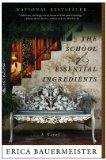Summary | Excerpt | Reading Guide | Reviews | Beyond the Book | Readalikes | Genres & Themes | Author Bio

Lillian stretched her fingers once, twice, and turned on the
light.
Lillian
Lillian had been four years old when her father left them,
and her mother, stunned, had slid into books like a seal
into water. Lillian had watched her mother submerge and disappear,
sensing instinctively even at her young age the impersonal
nature of a choice made simply for survival, and adapting to the
niche she would now inhabit, as a watcher from the shore of
her mother’s ocean.
In this new life, Lillian’s mother’s face became a series of
book covers, held in place where eyes, nose, or mouth might normally
appear. Lillian soon learned that book covers could forecast
moods much like facial expressions, for Lillian’s mother swam
deeply into the books she read, until the personality of the protagonist
surrounded her like a perfume applied by an indiscriminate
hand. Lillian was never sure who would greet her at the breakfast
table, no matter that the bathrobe, the hair, the feet were always
the same. It was like having a magician for a mother, although
Lillian always suspected that the magicians she saw at birthday
parties went home and turned back into portly men with three
children and grass that needed mowing. Lillian’s mother simply
finished one book and turned to the next.
Her mother’s preoccupation with books was not an entirely
silent occupation. Long before Lillian’s father had left them,
long before Lillian knew that words had a meaning beyond the
music of their inflections, her mother had read aloud to her. Not
from cardboard books with their primary-colored illustrations
and monosyllabic rhymes. Lillian’s mother dismissed the few
that entered their house under the guise of guilt.
“There’s no need to eat potatoes, Lily,” she would say, “when
four-course meals are ready and waiting.” And she would read.
For Lillian’s mother, every part of a book was magic, but
what she delighted in most were the words themselves. Lillian’s
mother collected exquisite phrases and complicated rhythms,
descriptions that undulated across a page like cake batter pouring
into a pan, read aloud to put the words in the air, where she
could hear as well as see them.
“Oh, Lily,” her mother would say, “listen to this one. It
sounds green, don’t you think?”
And Lillian, who was too young to know that words were
not colors and thoughts were not sounds, would listen while
the syllables fell quietly through her, and she would think, This
is what green sounds like.
After Lillian’s father left, however, things changed, and she
increasingly came to see herself simply as a mute and obliging
assistant in the accumulation of exceptional phrases, or, if
they happened to be somewhere public, as her mother’s social
cover. People would smile at the vision of a mother nurturing
her daughter’s literary imagination, but Lillian knew better. In
Lillian’s mind, her mother was a museum for words; Lillian
was an annex, necessary when space became limited in the
original building.
Not surprisingly, when it came time for Lillian to learn to
read, she balked. It was not only an act of defiance, although
by the time kindergarten started, Lillian was already feeling
toward books private surges of aggression that left her both confused
and slightly powerful. But it wasn’t just that. In Lillian’s
world, books were covers and words were sound and movement,
not form. She could not equate the rhythms that had
insinuated themselves into her imagination with what she saw
on the paper. The letters lay prone across the page, arranged in
unyielding precision. There was no magic on the page itself,
Lillian saw; and while this increased Lillian’s estimation of
her mother’s abilities, it did nothing to further her interest in
books.
From the prologue to The School of Essential Ingredients by Erica Bauermeister. Copyright Erica Bauermeister 2009. All rights reserved. No part of this book maybe reproduced without written permission from the publisher.
Your guide toexceptional books
BookBrowse seeks out and recommends the best in contemporary fiction and nonfiction—books that not only engage and entertain but also deepen our understanding of ourselves and the world around us.